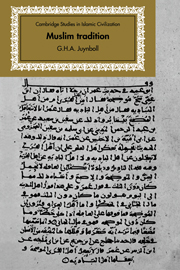Book contents
- Frontmatter
- Contents
- Preface
- Note to the Reader
- Introduction
- 1 A tentative chronology of the origins of Muslim tradition
- 2 The role of qāḍīs in the spreading of traditions
- 3 The man kadhaba tradition and the prohibition of lamenting the dead. An investigation into mutawātir traditions
- 4 An appraisal of muslim ḥadīth criticism. Rijāl works as depositories of transmitters' names
- 5 ‘Accepting traditions means knowing the men’
- Appendix I
- Appendix II
- Appendix III
- Appendix IV
- Appendix V
- Bibliography
- Index (glossary)
- Frontmatter
- Contents
- Preface
- Note to the Reader
- Introduction
- 1 A tentative chronology of the origins of Muslim tradition
- 2 The role of qāḍīs in the spreading of traditions
- 3 The man kadhaba tradition and the prohibition of lamenting the dead. An investigation into mutawātir traditions
- 4 An appraisal of muslim ḥadīth criticism. Rijāl works as depositories of transmitters' names
- 5 ‘Accepting traditions means knowing the men’
- Appendix I
- Appendix II
- Appendix III
- Appendix IV
- Appendix V
- Bibliography
- Index (glossary)
Summary
Abān b. Abī ʿAyyāsh (d. 138/756), mawlā, Tahdhīb, 1, pp. 97–101; he made Ḥasan's utterances via an isnād with Anas into prophetic sayings; it is stated that a total number of 1,500 traditions were brought into circulation in this manner, cf. also Ibn Ḥibbān, Kitāb al-majrūḥīn, 1, p. 56; Shuʿba is alleged to have said: la-an ashraba min bawli ḥimāri aḥabbu ilayya min an aqūla ḥaddathanī Abān; Abū ʿAwāna could kill him, he said, for his deceit, cf. Ibn Rajab, p. 116.
ʿAbbād b. Kathīr ath-Thaqafī (d. 140–50/758–67), Tahdhīb, v, pp. 100ff., … ḥaddatha ʿani … ′l-Ḥasan … bi ′l-muʿḍilāt; see further under ʿAbbād b. Rashīd with whom he probably was confused.
ʿAbbād b. Manṣūr (d. 152/769), Tahdhīb, v, pp. 103ff.; he was dāʿiya of the qadar doctrine.
ʿAbbād b. Rashīd, mawlā, Tahdhīb, v, pp. 92f., … rawā ʿani ′l-Ḥasan qāla ḥaddathanī sabʿatun mina ′ṣ-ṣaḥāba minhum ʿAbd Allāh b. ʿUmar wa-ʿAbd Allāh b. ʿAmr wa-Abū Hurayra wa-ghayruhum fi ′l-ḥijāma wa-qad rawāʿani ′l-Ḥasan bi-hādhā ′l-isnādi ḥadithan ṭawīlan aktharuhu mawḍūʿ.
ʿAbbād b. Maysara, Tahdhīb, v, pp. 107f., mentioned in one breath with the three previously-mentioned ʿAbbāds as ‘not strong’, but it is advised to copy his ḥadīth.
ʿAlī b. Zayd ibn Judʿān (d. 129/746), Tahdhīb, vii, pp. 322ff., was blind and kathīr al-ḥadīth; he was reputed to have a bad memory, but even so his ḥsdīth should be copied as long as it is not adduced as argument; was also a noted raffāʿ (see p. 32, note 103 above).
- Type
- Chapter
- Information
- Muslim TraditionStudies in Chronology, Provenance and Authorship of Early Hadith, pp. 218 - 220Publisher: Cambridge University PressPrint publication year: 1983

